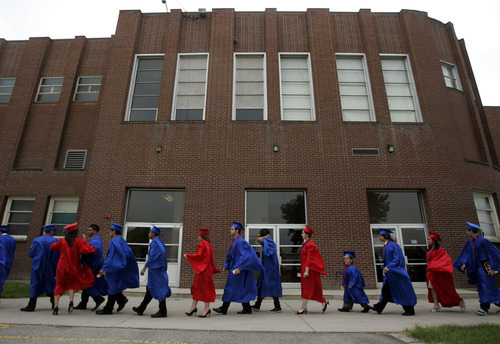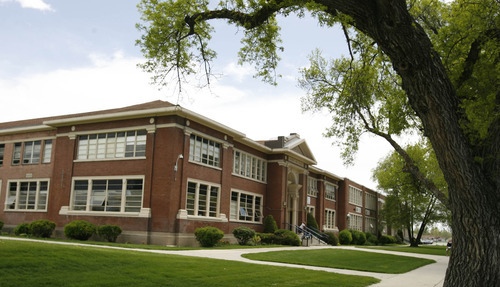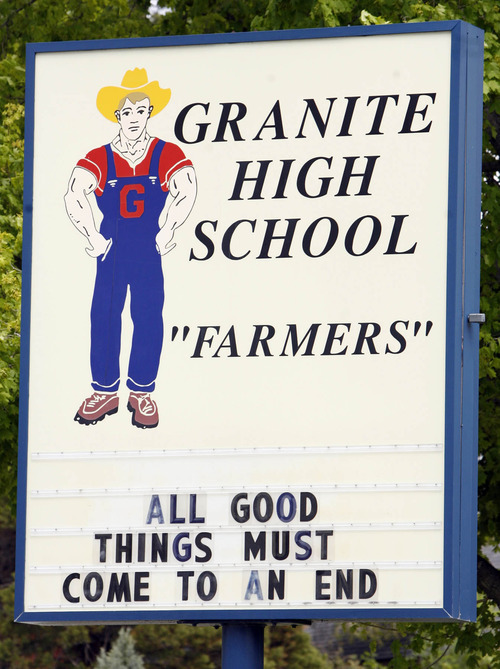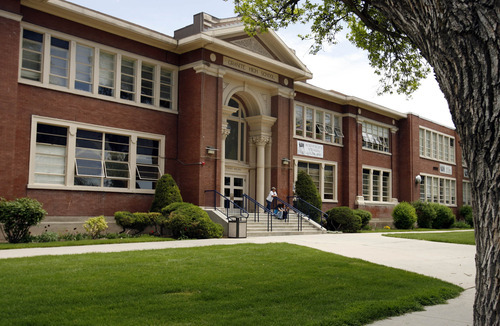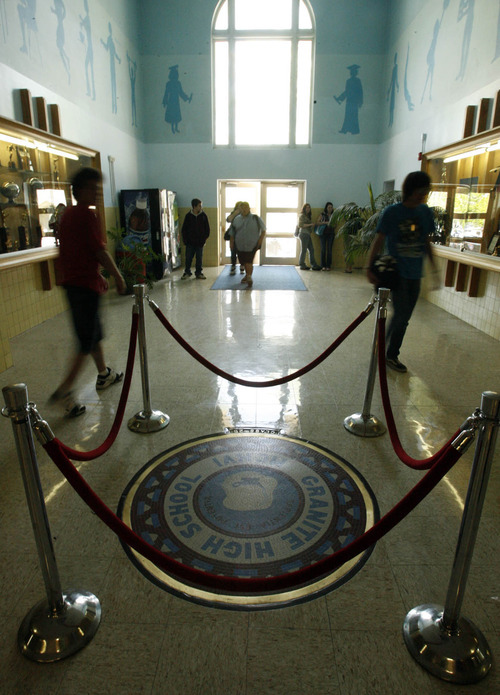This is an archived article that was published on sltrib.com in 2011, and information in the article may be outdated. It is provided only for personal research purposes and may not be reprinted.
South Salt Lake • The goal seems hard to knock: Buy Granite High, a century-old but now-vacant school, at a discounted price and convert it into a community center for residents of this lower middle-income city.
But the means of getting there — passage of a $25 million bond that would increase property taxes an average of $7 a month for residents, $13 a month for businesses — could be hard for income-strapped South Salt Lake voters to support when they go to the polls Nov. 8.
South Salt Lake officials know that anti-tax sentiments in this difficult economic environment could undermine their campaign to buy venerable Granite High and its athletic fields with a general obligation bond.
Still, they are heading into the election convinced they have molded a plan that would improve the quality of life for generations of South Salt Lake residents without imposing an unbearable tax burden.
"We have to take a stand for our city to be better than it is today," said City Councilman Casey Fitts. "We have UTA bus barns, TRAX garages, regional sewage-treatment plans, the [Salt Lake County] jail. But what serves us?"
Not much, argued Fitts and first-term Mayor Cherie Wood, contending the solution is to breathe new life into the Granite High campus, making it a centerpiece of South Salt Lake's identity, where students, artists, seniors, recreationists and others could gather.
Wood said that when she ran for mayor in 2009, residents asked her repeatedly about her plans for Granite High, whose final graduates received diplomas in June of that year, 103 years after the school opened.
"People are passionate about keeping the campus," she said. "The city's new tag line is 'City on the Move.' This is one of those projects that will help the city be on the move."
South Salt Lake has the right of first refusal to buy the four-building campus and its 27 acres from Granite School District for $8.7 million. That sum basically reflects the value of the land because the cost of renovating the buildings for use as a public school would exceed that value, said school district spokesman Ben Horsley.
The $25 million bond, said City Urban Design Director Sharen Hauri, would pay for the property, an earthquake upgrade of three buildings (the shop would be torn down) and conversion of the gym into a rec center. The main classroom building could be rented to a charter school, she said, adding that 50 nonprofit groups have expressed interest in having space there.
"We're confident we can fill it with paying tenants," Hauri said.
City resident Robert LeMone is not so sure. He questioned the need to heap more taxes on lower-income residents for a community center when the city already has the Columbus Center and Pioneer Craft House.
"How can you say you're helping the people of South Salt Lake if you're taxing them more?" he asked.
Joseph Bodell, who has operated Custom Sound Co. for two decades, said the city would be better off if the property went into the private sector, generating taxes instead of raising residents' taxes.
"We need revenue-earning properties," he said. "It would go to a developer for housing, and the city would get the property tax. What's the problem with that?"
That's the worst-case scenario to resident Emma Linschoten. "I would hate to see that developed into housing," she said, "apartments or condos or houses so close together they could, pardon my expression, spit on each other."
But she fears it might because many people she talks to are going to vote against the bond "if they vote at all. No one says it isn't a good idea. It's just that $7 a month. … To me, people waste that much going to 7-Eleven or to a movie and buying a tub of popcorn."
Steve Foote, president of the South Salt Lake Chamber of Commerce, said an informal poll of city businesses found mixed feelings about the bond proposal. But, overall, the chamber believes buying Granite High would be good for the city and its residents.
"From a big-picture scenario, this is one of many pieces that need to be put into place for a true fundamental change in the city's economic development," he said. "People we deal with at the chamber level understand we need change, and it will come with a price. What we see coming out of this is a more robust business environment, with people to coming to South Salt Lake instead of passing through."
If the bond vote fails, the school district would offer the property next to Salt Lake County or the state, Horsley said. But if those governments pass, the Granite campus could be sold to developers.
"Our preference," he said, "is to preserve it for taxpayers and the community."
Twitter: @sltribmikeg —
Granite High bond
The $25 million bond that South Salt Lake officials are promoting to purchase Granite High School would:
Acquire four existing buildings and 27 surrounding acres.
Cost the average city household $84 a year and similarly valued businesses $151.
Pay for seismic upgrades on three buildings.
Likely convert the facilities into a charter school and a community center with after-school and senior programs.
Convert the gym into a recreation center.
Source: South Salt Lake —
School tour
South Salt Lake will conduct the last of a series of tours of Granite High, 3305 S. 500 East, from 6 p.m. to 7 p.m. Tuesday. Meet at the 500 East entrance to the main classroom building.


